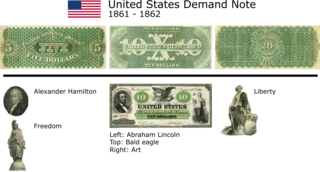Related Research Articles

The Bank of England is the central bank of the United Kingdom and the model on which most modern central banks have been based. Established in 1694 to act as the English Government's banker and debt manager, and still one of the bankers for the Government of the United Kingdom, it is the world's eighth-oldest bank.
In finance, equity is an ownership interest in property that may be offset by debts or other liabilities. Equity is measured for accounting purposes by subtracting liabilities from the value of the assets owned. For example, if someone owns a car worth $24,000 and owes $2000 on the loan used to buy the car, the difference of $22,000 is equity. Equity can apply to a single asset, such as a car or house, or to an entire business. A business that needs to start up or expand its operations can sell its equity in order to raise cash that does not have to be repaid on a set schedule.

His Majesty's Treasury, occasionally referred to as the Exchequer, or more informally the Treasury, is a ministerial department of the Government of the United Kingdom. It is responsible for developing and executing the government's public finance policy and economic policy. The Treasury maintains the Online System for Central Accounting and Reporting, the replacement for the Combined Online Information System, which itemises departmental spending under thousands of category headings, and from which the Whole of Government Accounts annual financial statements are produced.
Scripophily is the study and collection of stock and bond certificates. A specialized field of numismatics, scripophily has developed as an area of collecting because of the inherent beauty of certain historical certificates, and because of interest in the historical context of many of the documents. In addition, some stock certificates serve as excellent examples of engraving. Occasionally, an old stock certificate is found that still has value, representing actual shares in the original or a successor company.
A treasury stock or reacquired stock is stock which is bought back by the issuing company, reducing the amount of outstanding stock on the open market.
Preferred stock is a component of share capital that may have any combination of features not possessed by common stock, including properties of both an equity and a debt instrument, and is generally considered a hybrid instrument. Preferred stocks are senior to common stock but subordinate to bonds in terms of claim and may have priority over common stock in the payment of dividends and upon liquidation. Terms of the preferred stock are described in the issuing company's articles of association or articles of incorporation.
Common stock is a form of corporate equity ownership, a type of security. The terms voting share and ordinary share are also used frequently outside of the United States. They are known as equity shares or ordinary shares in the UK and other Commonwealth realms. This type of share gives the stockholder the right to share in the profits of the company, and to vote on matters of corporate policy and the composition of the members of the board of directors.

In financial markets, a share is a unit of equity ownership in the capital stock of a corporation. It can refer to units of mutual funds, limited partnerships, and real estate investment trusts. Share capital refers to all of the shares of an enterprise. The owner of shares in a company is a shareholder of the corporation. A share expresses the ownership relationship between the company and the shareholder. The denominated value of a share is its face value, and the total of the face value of issued shares represent the capital of a company, which may not reflect the market value of those shares.
Shares outstanding are all the shares of a corporation that have been authorized, issued and purchased by investors and are held by them. They are distinguished from treasury shares, which are shares held by the corporation itself, thus representing no exercisable rights. Shares outstanding and treasury shares together amount to the number of issued shares.

Capital surplus, also called share premium, is an account which may appear on a corporation's balance sheet, as a component of shareholders' equity, which represents the amount the corporation raises on the issue of shares in excess of their par value of the shares.
Earnings per share (EPS) is the monetary value of earnings per outstanding share of common stock for a company during a defined period of time. It is a key measure of corporate profitability, focussing on the interests of the company's owners (shareholders), and is commonly used to price stocks.

A Demand Note is a type of United States paper money that was issued from August 1861 to April 1862 during the American Civil War in denominations of 5, 10, and 20 US$. Demand Notes were the first issue of paper money by the United States that achieved wide circulation. The U.S. government placed Demand Notes into circulation by using them to pay expenses incurred during the Civil War including the salaries of its workers and military personnel.
Sundray Tucker is an American singer.
The authorised capital of a company sometimes referred to as the authorised share capital, registered capital or nominal capital, is the maximum amount of share capital that the company is authorised by its constitutional documents to issue (allocate) to shareholders. Part of the authorised capital can remain unissued. The authorised capital can be changed with shareholders' approval. The part of the authorised capital which has been issued to shareholders is referred to as the issued share capital of the company.
In economics and law, issued shares are the shares of a corporation which have been allocated (allotted) and are subsequently held by shareholders. The act of creating new issued shares is called issuance. Allotment is simply the transfer of shares to a subscriber. After allotment, a subscriber becomes a shareholder, though usually that also requires formal entry in a share registry.

The Malta Stock Exchange, known as the Borża ta' Malta, is the stock exchange of the island nation of Malta. Since being set up in 1992, the Exchange has been key to the raising of capital for the private sector through the issue of corporate bonds and equity while virtually all the national debt of Government of Malta has been issued in the form of Malta Government bonds and treasury bills that are listed and traded on the secondary market.

This is a survey of the postage stamps and postal history of Korea. Before a strict isolationist country, Korea began to open up in the second half of the 19th century.

In September 2008, the Federal Housing Finance Agency (FHFA) announced that it would take over the Federal National Mortgage Association and the Federal Home Loan Mortgage Corporation. Both government-sponsored enterprises, which finance home mortgages in the United States by issuing bonds, had become illiquid as the market for those bonds collapsed in the subprime mortgage crisis. The FHFA established conservatorships in which each enterprise's management works under the FHFA's direction to reduce losses and to develop a new operating structure that will allow a return to self-management.
The Troubled Asset Relief Program (TARP) is a program of the United States government to purchase toxic assets and equity from financial institutions to strengthen its financial sector that was passed by Congress and signed into law by President George W. Bush. It was a component of the government's measures in 2009 to address the subprime mortgage crisis.

On March 23, 2009, the United States Federal Deposit Insurance Corporation (FDIC), the Federal Reserve, and the United States Treasury Department announced the Public–Private Investment Program for Legacy Assets. The program is designed to provide liquidity for so-called "toxic assets" on the balance sheets of financial institutions. This program is one of the initiatives coming out of the implementation of the Troubled Asset Relief Program (TARP) as implemented by the U.S. Treasury under Secretary Timothy Geithner. The major stock market indexes in the United States rallied on the day of the announcement rising by over six percent with the shares of bank stocks leading the way. As of early June 2009, the program had not been implemented yet and was considered delayed. Yet, the Legacy Securities Program implemented by the Federal Reserve has begun by fall 2009 and the Legacy Loans Program is being tested by the FDIC. The proposed size of the program has been drastically reduced relative to its proposed size when it was rolled out.
References
- ↑ "unissued stock". LII / Legal Information Institute. Retrieved 2024-11-07.